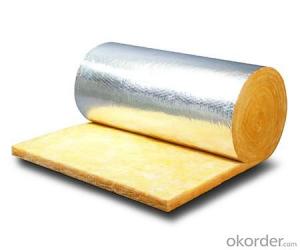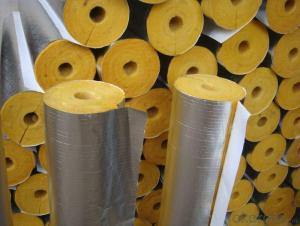white facing glass rock wool pipe/white pipe insulation
- Loading Port:
- Tianjin
- Payment Terms:
- TT OR LC
- Min Order Qty:
- 5000 m²
- Supply Capability:
- 20000 m²/month
OKorder Service Pledge
OKorder Financial Service
You Might Also Like
1.Description of Glass Wool Blanket:
Rockwool is manufactured primarily from a melt of volcanic rock. The molten rock is spun into wool and resin impregnated. Rockwool when pressed into rolls and sheets package air very well which make it an excellent and reliable insulator. All output types of Rockwool are a poor conductor of heat and sound, and therefore Rockwool is also considered an excellent and reliable thermal-acoustic insulator.
Rockwool is a mineral non-organic fibrous material of excellent and distinguished properties and characteristics. It is efficiently utilized in all fields of thermoacoustic insulation; furthermore it is used in many industries and agricultural activities.
2.Main features of Glass Wool Blanket:
g):ventilation property
Glass wool, with multiaperture structure and special prescription, make its better performance in ventilation property. It contribute to moisture diffusion indoor and wall and greatly decrease the possibility of leaf mold growth. Thus it can help to increase service life of building and indoor comfort level.
h): Hydrophobicity
Hydrophobicity glass wool in panel wall bears 99% Hydrophobicity rate. It can easily get dry naturally, which ensure its long-term heat preservation perporty.
i): Light in weight
Glass wool bears good heat preservation and soundproofing property. It’s low density product can meet energy saving requirement. Thus it helps to decrease the weight of building and makes the construction more expedite.
k): construction and installation property
Glass wool, with slender fiber and no dregs, can avoid the scuffing or pruritus irritation.
3.Glass Wool Blanket Images:
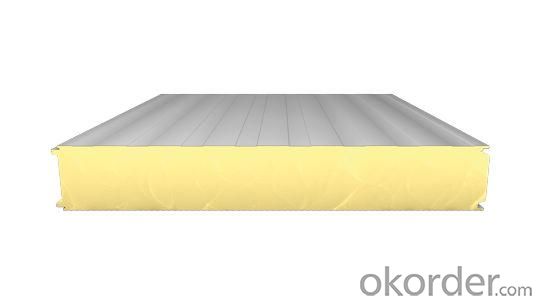
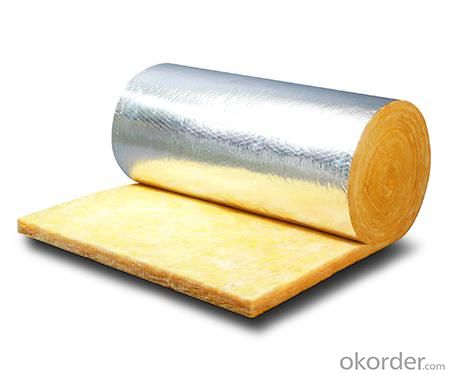
4. Glass Wool Insulation Blanket Technical Parameters:
Property | High/low temperature resistance, oil and fuel resistance, weathering resistance, O zone resistance etc. |
Shape | According to your requirement. |
Color | Any color is available ,according to your requirements. |
Material | NBR, CR, SBR, EPDM, IIR, NR, EP, Silicone, VITON etc. |
Hardness | 30-90ShoreA |
Delivery | In 10 days |
Packing | Plastic bag & carton box or according to your requirements. |
Application | Electronic field, industrial machine & equipment, house-hold appliance, telecommunication, automobile, medical equipment industry etc. |
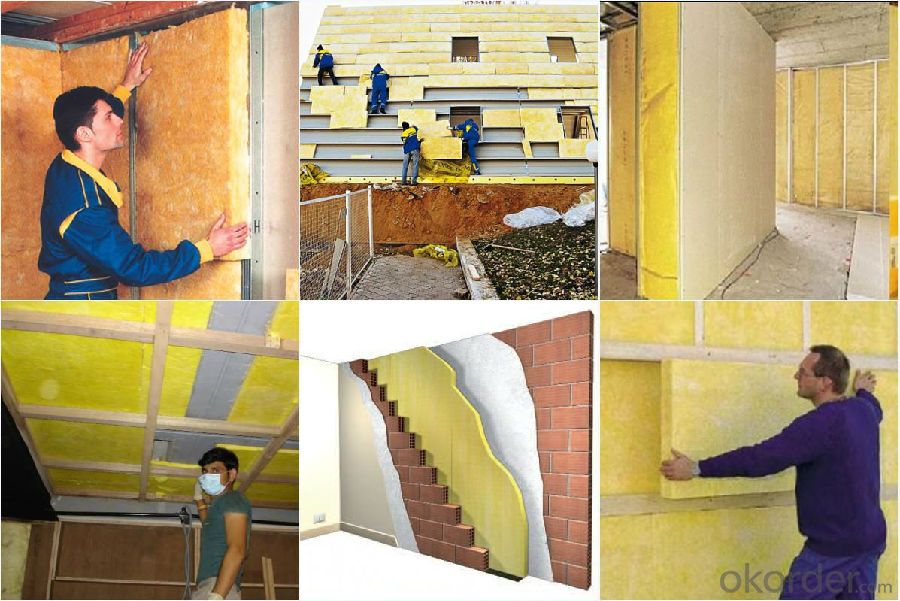
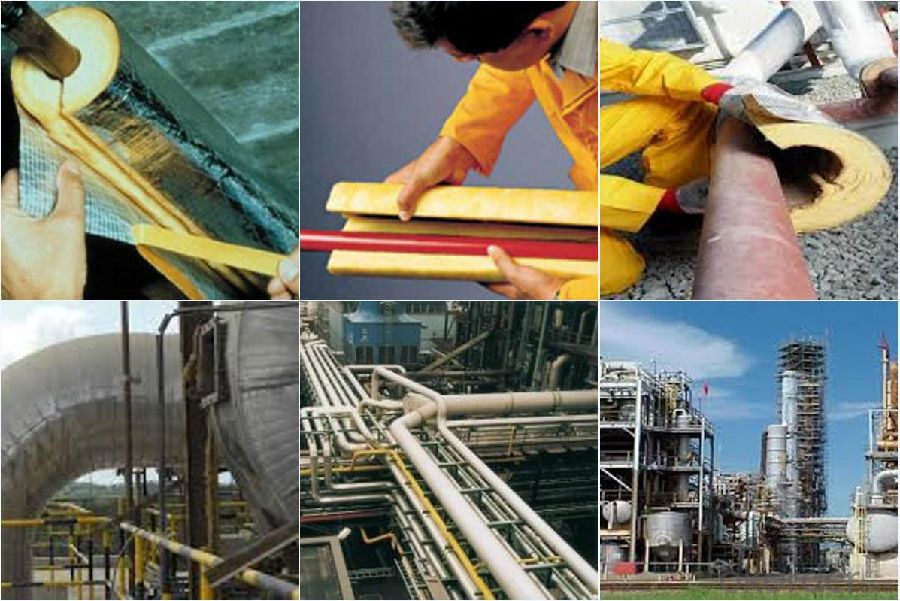
5.FAQ
We have organized several common questions for our clients,may help you sincerely:
①How about your company?
A world class manufacturer & supplier of Glass Wool Blanket is one of the large scale professional investment casting production bases in China,consisting of both casting foundry forging and machining factory. Annually more than 8000 tons Precision casting and forging parts are exported to markets in Europe,America and Japan. OEM casting and forging service available according to customer’s requirement.
②How to guarantee the quality of the products?
We have established the international advanced quality management system every link from raw material to final product we have strict quality test; We resolutely put an end to unqualified products flowing into the market. At the same time, we will provide necessary follow-up service assurance.
- Q:What is the abrasion resistance of fiberglass mat tissue?
- The abrasion resistance of fiberglass mat tissue is relatively high. Fiberglass mat tissue is made up of fine fibers of glass that are woven or pressed together to form a mat. These fibers are known for their strength and durability, making them resistant to abrasion. This means that the fiberglass mat tissue is less likely to wear, tear, or become damaged when subjected to friction or rubbing against other surfaces. It can withstand the scraping, scratching, or rubbing action without losing its integrity or structural integrity. Therefore, fiberglass mat tissue is often used in applications where abrasion resistance is important, such as in the construction industry for reinforcing concrete or in the manufacturing of composite materials.
- Q:How does the roll diameter of fiberglass mat tissue affect its handling?
- The handling of fiberglass mat tissue can be significantly impacted by the diameter of the roll. When the roll diameter is larger, the roll becomes heavier and bulkier, which poses a greater challenge for handling and maneuvering. This is especially important when the fiberglass mat tissue needs to be transported or installed manually. Furthermore, lifting and moving a larger roll diameter requires more physical effort, putting strain on those handling it. Additionally, larger roll diameters occupy more space, making storage and transportation more complicated. On the other hand, a smaller roll diameter makes the fiberglass mat tissue easier to handle due to its lighter and more compact nature. This is particularly advantageous in situations that involve frequent movement and installation, such as construction sites or manufacturing facilities. Moreover, a smaller roll diameter allows for more efficient storage and transportation as it takes up less space and can be easily stacked. This optimization of logistics helps minimize the costs associated with storage and transportation. In summary, the roll diameter of fiberglass mat tissue directly impacts its handling characteristics. Larger diameters make handling more challenging, while smaller diameters provide easier handling and improved storage efficiency.
- Q:What is the weathering resistance of fiberglass mat tissue?
- Fiberglass mat tissue is renowned for its high weathering resistance. It is composed of a blend of fiberglass strands and a binder material, such as polyester or acrylic. This combination produces a sturdy and resilient material that can withstand a range of weathering factors, such as sunlight, moisture, and temperature fluctuations. The fiberglass strands within the mat tissue offer exceptional mechanical strength, preventing the material from succumbing to external stress or pressure. This strength enables the mat tissue to endure the impact of wind, rain, and other weather elements without sustaining significant damage. Moreover, the binder material utilized during the manufacturing process of fiberglass mat tissue is often specially formulated to resist UV radiation. This UV resistance effectively shields the material from degradation and fading caused by prolonged exposure to sunlight. It also contributes to maintaining the structural integrity and strength of the mat tissue over time. Furthermore, fiberglass mat tissue exhibits resistance to moisture and water absorption. This resistance ensures that the material does not weaken or deteriorate when exposed to rain, humidity, or other sources of moisture. Consequently, the mat tissue remains intact and retains its performance properties even in wet or humid conditions. Overall, fiberglass mat tissue boasts excellent weathering resistance, making it a highly sought-after option for various applications that demand durability and longevity in outdoor environments.
- Q:Can fiberglass mat tissue be used for insulation in commercial buildings?
- Yes, fiberglass mat tissue can be used for insulation in commercial buildings. It is a common and effective insulation material that provides thermal insulation, soundproofing, and fire resistance properties. It is often used in commercial buildings to improve energy efficiency and create a comfortable indoor environment.
- Q:How long does fiberglass mat tissue last?
- The lifespan of fiberglass mat tissue varies depending on various factors such as the quality of the material, environmental conditions, and maintenance. However, on average, fiberglass mat tissue can last for several decades if properly installed and cared for.
- Q:How does the fiber content of fiberglass mat tissue affect its strength?
- The fiber content of fiberglass mat tissue directly affects its strength. The higher the fiber content, the stronger the fiberglass mat tissue will be. This is because the fibers provide the structural integrity and reinforcement to the material. When the fiber content is increased, it results in a higher concentration of fibers, which in turn increases the overall strength of the tissue. Fiberglass mat tissue is composed of glass fibers that are randomly oriented and bound together with a resin binder. These fibers are responsible for carrying the load and providing resistance to any external forces or stresses applied to the material. As a result, the more fibers present in the tissue, the greater the load-carrying capacity and strength of the material. Additionally, a higher fiber content enhances the stiffness of the fiberglass mat tissue. Stiffness refers to the ability of a material to resist deformation or bending under applied loads. With a greater amount of fibers, the tissue becomes stiffer, making it less prone to bending or flexing. This increased stiffness contributes to the overall strength of the material. It is important to note that while a higher fiber content improves the strength of fiberglass mat tissue, there is an optimal range where the benefits of additional fibers are maximized. Beyond this range, the increased fiber content may not result in a significant improvement in strength, and it may have diminishing returns. Therefore, it is crucial to find the right balance between fiber content and strength for specific applications. In conclusion, the fiber content of fiberglass mat tissue directly impacts its strength. Increasing the fiber content leads to a higher concentration of fibers, which enhances the material's load-carrying capacity and stiffness. Finding the optimal fiber content is essential to maximize the strength of the tissue for specific applications.
- Q:How does fiberglass mat tissue perform in high temperatures?
- Fiberglass mat tissue performs well in high temperatures as it has a high melting point and excellent heat resistance. It retains its strength and structural integrity even when exposed to elevated temperatures, making it suitable for various applications in high-temperature environments.
- Q:Can fiberglass mat tissue be used for insulation in shopping malls?
- Yes, fiberglass mat tissue can be used for insulation in shopping malls. It is a common and effective material for thermal insulation due to its low thermal conductivity and high resistance to heat transfer. Fiberglass mat tissue is also non-combustible, making it a safe option for commercial buildings like shopping malls. Additionally, it is lightweight, easy to install, and has excellent sound absorption properties, which can help in creating a comfortable and quiet environment within the mall. Overall, fiberglass mat tissue is a suitable choice for insulation in shopping malls, providing energy efficiency and improved indoor comfort.
- Q:Is fiberglass mat tissue suitable for automotive applications?
- Yes, fiberglass mat tissue is suitable for automotive applications. Fiberglass mat tissue is a versatile material that offers numerous benefits when used in automotive applications. It provides excellent strength and durability, which is essential for automotive parts that need to withstand harsh conditions and heavy usage. Fiberglass mat tissue also has good thermal and electrical insulation properties, making it suitable for applications where temperature resistance and electrical insulation are required. Additionally, fiberglass mat tissue is lightweight, which can help improve fuel efficiency and overall vehicle performance. It is also easy to mold and shape, allowing manufacturers to create complex automotive parts with precision. Furthermore, fiberglass mat tissue is resistant to corrosion, chemicals, and UV radiation, ensuring the longevity and reliability of automotive components. Overall, the unique properties of fiberglass mat tissue make it an ideal choice for various automotive applications, including but not limited to body panels, interior components, structural reinforcements, and sound insulation. Its strength, durability, insulation properties, lightweight nature, and resistance to corrosion and chemicals make it a reliable and cost-effective material for the automotive industry.
- Q:Can fiberglass mat tissue be used for insulation purposes?
- Yes, fiberglass mat tissue can be used for insulation purposes. Fiberglass mat tissue is a lightweight material made from fine strands of glass fibers that are bonded together with a binder. It is commonly used as a reinforcement material in the construction industry, but it can also be used as insulation. Fiberglass mat tissue has excellent thermal insulation properties, making it an effective choice for insulating buildings and other structures. It helps to prevent heat transfer, keeping the interior of a building warm in cold weather and cool in hot weather. Additionally, it is non-combustible, which makes it a safe option for insulation. The flexibility and ease of installation of fiberglass mat tissue make it a popular choice for insulating walls, roofs, and floors. It can be easily cut and shaped to fit different spaces, making it versatile for various construction projects. It is also resistant to moisture, mold, and mildew, ensuring long-lasting insulation performance. In summary, fiberglass mat tissue can indeed be used for insulation purposes. Its thermal insulation properties, non-combustible nature, and ease of installation make it a suitable choice for insulating buildings and improving energy efficiency.
1. Manufacturer Overview |
|
|---|---|
| Location | |
| Year Established | |
| Annual Output Value | |
| Main Markets | |
| Company Certifications | |
2. Manufacturer Certificates |
|
|---|---|
| a) Certification Name | |
| Range | |
| Reference | |
| Validity Period | |
3. Manufacturer Capability |
|
|---|---|
| a)Trade Capacity | |
| Nearest Port | |
| Export Percentage | |
| No.of Employees in Trade Department | |
| Language Spoken: | |
| b)Factory Information | |
| Factory Size: | |
| No. of Production Lines | |
| Contract Manufacturing | |
| Product Price Range | |
Send your message to us
white facing glass rock wool pipe/white pipe insulation
- Loading Port:
- Tianjin
- Payment Terms:
- TT OR LC
- Min Order Qty:
- 5000 m²
- Supply Capability:
- 20000 m²/month
OKorder Service Pledge
OKorder Financial Service
Similar products
New products
Hot products
Related keywords
